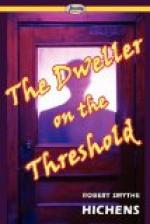Chichester looked much startled and taken aback.
“I—oh, no!”
“Then we must get along in the dark and make the best of it.”
Having said this, the professor abruptly dismissed the subject and began to talk of other things. When he chose he could be almost charming. He chose on this occasion. And when at last he hailed a bus, declaring that he was due at home, Chichester expressed a hope that some day he would find himself in Hornton Street, and visit number 4a.
The professor assented, and was carried westward.
Several days passed, but he did not find himself near Horton Street, and he had ceased to visit the South Kensington Museum. Then the curate wrote and invited him to tea. Despite a pretence at indifference in the phraseology of the note, the professor discovered a deep anxiety in the writing. Among other things he had studied, and minutely, graphology.
He sat down and very politely refused the invitation.
Then Chichester came to call on him, and caught him at home.
It was six o’clock in the evening, and the heavens were opened. Agnes, the Scotch parlor-maid who claimed to have second sight, opened the door to Chichester, who, speaking from beneath a dripping umbrella, inquired for the professor.
“He’s in, sir, but he’s busy.”
“Could you take him my card?”
Agnes took it, much to her own surprise, and carried it to the professor’s study.
“A gentleman, sir.”
“I told you, Agnes—”
“I couldn’t say no to him, sir.”
“Why not? Here!” he took the card.
“Why not?” he repeated, when he had read the name.
“It wasn’t in me to, sir.”
“Well, then I shall have to see him. Show him up. But never again will I call you by the proud name of Cerberus.”
So, putting the onus upon Agnes, the professor yielded, murmuring to himself:
“It wasn’t in her to! Very expressive! And Cerberus, by the way, was always ready to let ’em in. It was when they wanted to get out that—Good evening. I hope you don’t mind climbing.”
“Thank you, no,” said Chichester.
“Sit down.”
“I am afraid I disturb you.”
“I’m bound to say you do. But what does it matter?”
“As you didn’t find your way to Hornton Street, I thought I would venture.”
“Very good of you. This is a soft chair.”
Chichester sat down. It had been evident to Stepton from the moment when his visitor came in that he was in great agony of mind. There was in his face a sort of still and abject misery which Stepton thought exceedingly promising. As he turned round, leaning his sharp elbow on his writing-table, Stepton was considering how to exploit this misery for the furthering of his purpose.
“I want you to tell me something,” Chichester began. “I want to know why your attention was first attracted to me. I feel sure that you must be able to give a reason. What is it?”




